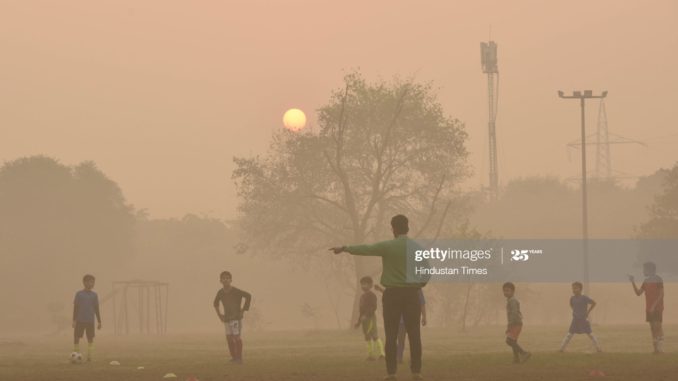
New Delhi — India’s government has established a permanent commission to tackle the growing problem of deteriorating air quality in New Delhi, regarded as the world’s most polluted national capital.
Under an ordinance passed by the government on Oct. 28, the ‘Commission for Air Quality Management in the National Capital Region (NCR) and Adjoining Areas’ was established. The new law dissolves the Environmental Pollution (Prevention and Control) Authority (EPCA) established in 1998 to address air pollution in the National Capital Region, which encompasses the National Capital Territory of Delhi and several adjoining districts in the states of Haryana, Uttar Pradesh and Rajasthan.
The new body, which will have the authority to shut down or regulate water and electricity supply to industries or sites that cause air pollution, awaits final approval by the Supreme Court. The body will also be allowed to seize and search under the Code of Criminal Procedure, 1973, and issue a warrant, and it can issue penalties of INR 1 crore ($134,165) and/or a five-year jail term.
Lawyers and environmentalists cited lack of interstate coordination as one of the drawbacks of the former EPCA.
“The new commission would have members from both the Center and the states, and will look into the issues of planning and execution of policy and interventions, operations of industry, inspections, research into the causes of pollution, etc.,” said Kashish Aneja, an advocate at the Supreme Court of India.
“I see the absence of the Ministry of Health from this list as a major concern. Public health issues involve multiple regimes and need to be looked at from a rights-based approach. The key to effectively monitor air quality is a coordinated effort between multiple ministries, state governments … and technical experts,” he said.
Aneja said that the new commission will not automatically guarantee success.
“A lot is dependent on how it functions and coordinates efforts between the states and different ministries. However, the foundation it is built on is a good place to start,” he said.
Every winter, especially from October to December, India’s northern states are enveloped in a thick layer of smog, disrupting the regular course of life. This is generally attributed to the burning of straw stubble to clear the way to sow wheat, although farmers blame industries near the cities.
Residents are exposed to a host of respiratory and related diseases, including stroke, heart disease, chronic obstructive pulmonary disease, and lung cancer.
Last November, Delhi’s air quality was so poor that authorities declared a public health emergency and shut down schools in the city and surrounding suburbs for several days.
“When the air is this bad that the government is forced to shut down schools, why doesn’t it act to prevent this situation?” said Bhavreen Kandhari, a New Delhi-based environmentalist.
Kandhari is a member of WarriorMoms, a group of over 1,000 mothers in India working towards a pollution-free country for their children.
“I get scared when I think of the toxic air my children are exposed to. No parent would want their kids to grow in such unhealthy surroundings. But the authorities hardly care. This is the reason we are now on a war footing, no more sweet talks and persuasion,” she said.
Residents of various cities have repeatedly voiced their displeasure over the government’s handling of the air pollution problem. Most of the measures to date have been short-term, with little in the way of long-term solutions, such as providing farmers with viable alternatives to stubble burning.
This year the government came up with new technology to decompose straw in the fields.
“The NCR and Punjab will use a new technology developed by the Pusa Agriculture Institute, the Indian Council of Agricultural Research and the Indian Agricultural Research Institute to decompose straw in the fields,” Environment Minister Prakash Javadekar said on Oct. 1, after taking stock of the states’ preparedness to tackle air pollution this winter.
However, so far this season, the National Capital Region has been blanketed in smog, and the air quality index (AQI) on New Delhi stood at 288 — listed as “very unhealthy” — on Oct. 30.
A combination of low temperature and stubble burning has been cited as the major contributor to the poor air quality. As per the System of Air Quality and Weather Forecasting Centre, stubble burning on Oct 29 reached a season-high of 36 percent in terms of its PM2.5 (fine inhalable particles) contributions to Delhi’s air. In 2019, the maximum recorded PM2.5 contribution from stubble burning was 44 percent.
“Every year, the air quality, especially in northern India plummets, pushing millions of Indians into a gas chamber. The use of firecrackers during Diwali exacerbates the situation. Children below five are the worst affected,” said Kandhari.
The Diwali festival India is celebrated to mark the return of Hindu god Ram after his victory over Ravana.
“Bursting of firecrackers leads to a substantial increase in PM 2.5 levels. It is a serious health hazard, not just for humans, but even for animals and birds. We simply cannot afford to lose our guard, especially when the country is reeling under the onslaught of Covid-19, which is yet to have a cure or a vaccine. Air pollution can increase the chances of Covid-19 deaths,” said Dr. Arvind Kumar with the Lung Care Foundation and Doctors for Clean Air.
A joint study titled “State of Global Air 2020’ found that infants born in sub-Saharan Africa and South Asia had the highest rates of neonatal deaths attributable to air pollution. The figures range from 9,000 to 13,100 per 100,000 live births. More than 116,000 infants died in India from air pollution in the first month of life.
Six of the world’s most polluted cities are located in India, according to the latest World Air Quality report released by IQAir in March.
(Edited by Uttaran Das Gupta and Judy Isacoff.)
The post India Sets Up New Commission to Curb Air Pollution in National Capital appeared first on Zenger News.
